Hard water is any water that contains a high quantity of dissolved minerals; it typically happens when groundwater through limestone. Hard water can be great for taste, but it is hard on your plumbing. For the sake of making their plumbing last, people typically use water softeners.
Here are 7 signs that you have hard water, how you should fix it, and why you don't want to have hard water.
7 Signs You Have Hard Water & Why You Should Soften It
While it may not be something you commonly think about, the quality of your water can greatly impact not only your health but the health of your home. You've probably heard the term “hard water” tossed around a time or two, but what is hard water? How does it occur and why is it bad?
To help you understand the signs and potential damage of hard water, you first have to understand the basics behind it. We'll give you all the facts you need to know and walk you through how to spot hard water in your home. Plus, we'll even give you some tips on how to soften your water to a more appropriate level.
What Is Hard Water?
Before we go anywhere, we have to understand the biggest question of them all: what is hard water?
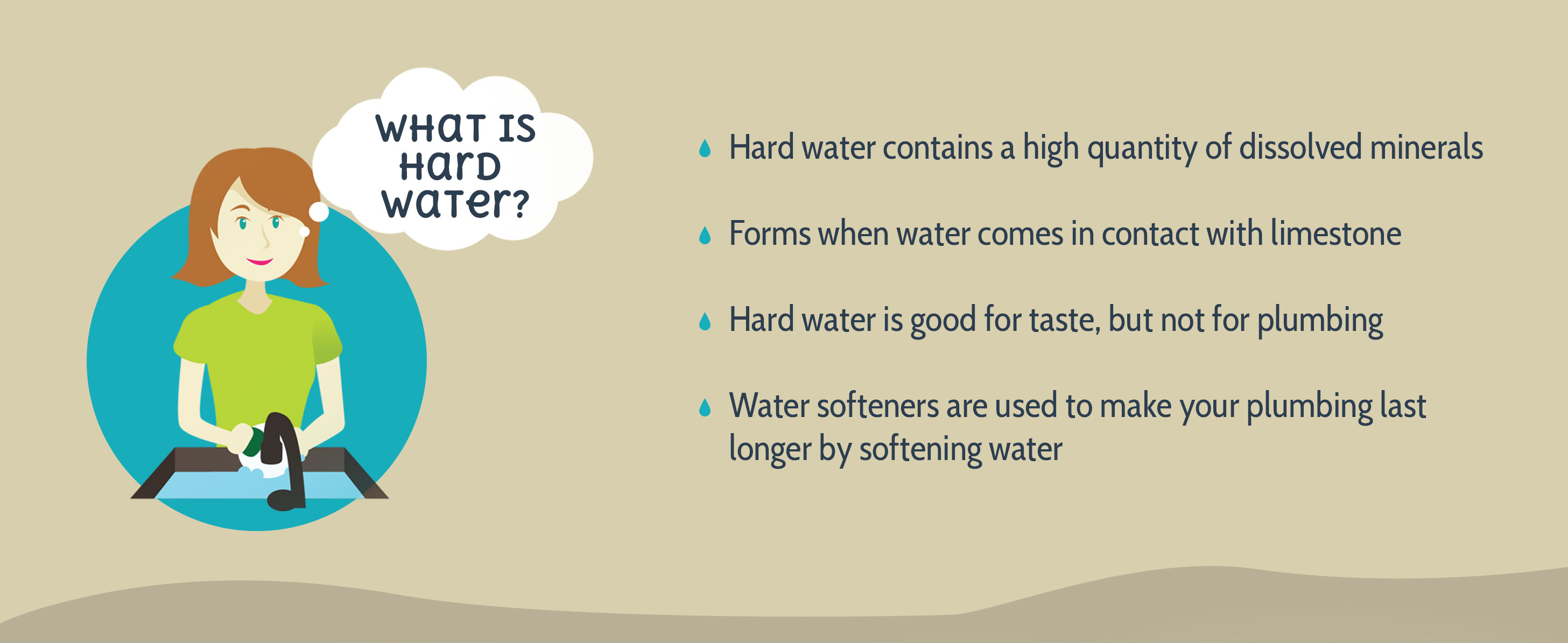
Hard water refers to any type of water that has had a large quantity of minerals dissolved into it. A lot of times, this sort of thing occurs because of the underground systems we use to transport water from the tower to our kitchen. There, the water may come in contact with limestone and turn it from soft to hard.
What is hard water good for? Not much. Some people find the taste to be more desirable, especially if you have grown up with that taste all your life. However, hard water can be quite unrelenting on your plumbing, often causing for repairs and replacements far sooner than should be expected.
In fact, the Water Quality Association has stated that your appliances and hardware can decrease their lifespan by 3 to 4.5 years. Washing machines can go from lasting 11 years down to just 7.7, dishwashers can go from a 10-year lifespan to 7 years, and a faucet can go from 8 years down to 5.4 before it will need to be replaced.
To top it off, your toilet, which could be expected to last 6.5 years can go down to just 2 years when it is running on hard water. That's less than half of its life expectancy and will end up costing you a ton of money to constantly repair or replace.
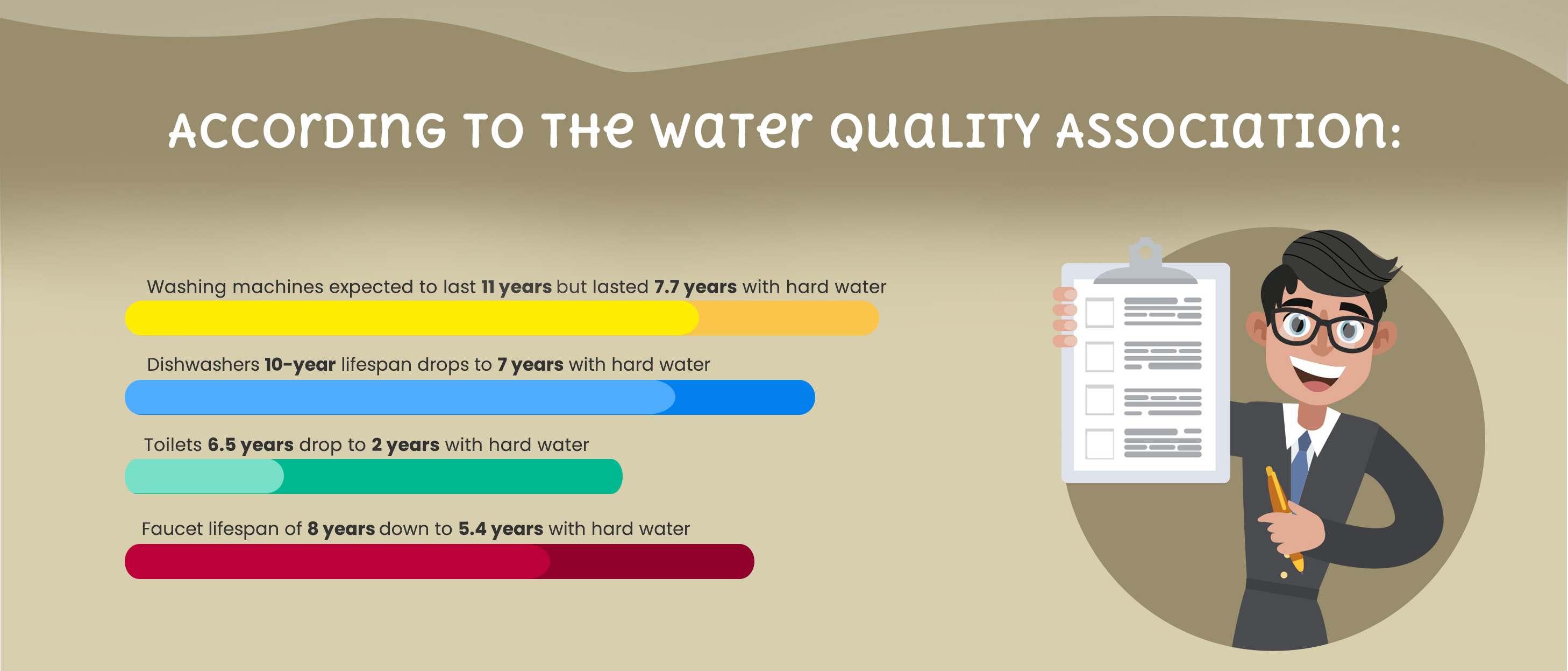
7 Signs That You Have Hard Water
Learning what is hard water and what is not is the simple part. The hard part is determining whether the water in your home is hard. If you want to keep your appliances in good health, and yourself, you're going to want to keep an eye out for these seven major signs of hard water.
1. Your Water Tastes or Smells Funny

Image Source: www.flickr.com
That's weird. Why does my water taste like that? Everyone knows what they like their water to taste like, but if it starts to taste a bit funny, you may want to think about investing in some water softener.
A good way to indicate what might be wrong with your water is what it tastes like. If you are left with a metallic taste in your mouth, it's more than likely that your water contains too much iron. Generally speaking, you do not want to have more than 10 milligrams of iron per liter of water. Rainwater often infiltrates the soil and then mixes in with aquifers, dragging iron particles into the system.
Another thing to watch out for is if your water tastes like dirt. There are a number of different things that could cause this, and many of them could become harmful. You could have too much sediment in your water, there may be algae growing in the water pipes, or your pipes may just be old and falling apart.
While you're at it, let your nose do a bit of the work for you as well. If you smell rotten eggs when you pour a glass of water, you're probably smelling a high level of sulfur bacteria in your water. For some people, the smell only becomes noticeable when they use hot water, while for others, it could be both hot and cold.

2. Strange Stains
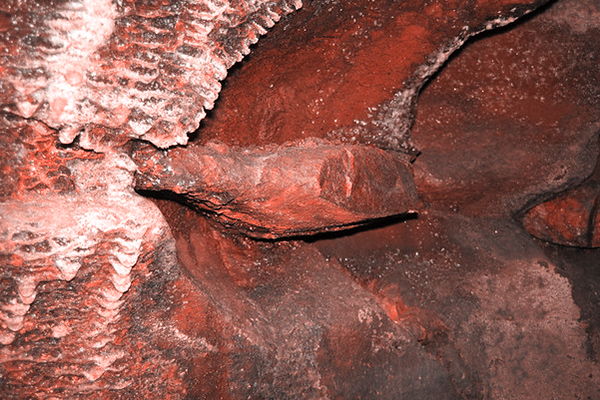
Image Source: www.flickr.com
If your water is at a normal mineral level, it should not leave any sort of stain behind. That should be a big red flag to you if it does because there's a high likelihood your water is hard.
When you look at your sink or toilet and see a reddish brown stain, that's because there is too much iron and magnesium in your water. When the water moves past rocks and soil, it will tend to dissolve the minerals it passes and absorb it into its water.
You can easily get rid of that stain with a bit of vinegar, but that won't stop your problem. It will only continue to worsen as time goes on, and the stain will come back again and again and again—until you fix the problem at least.

3. Soap Scum
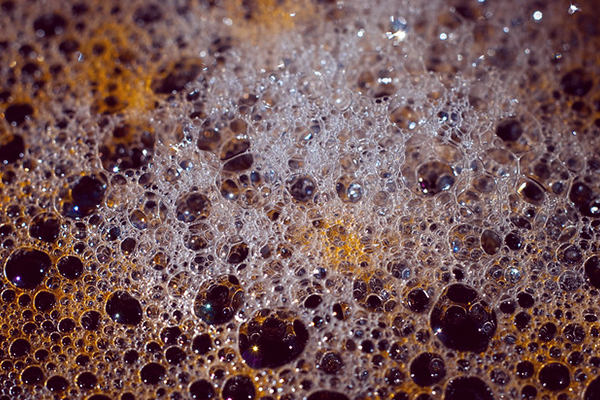
Image Source: www.flickr.com
Soap is supposed to make things cleaner for us, but when it mixes with too much hard water, it can end up creating more of a mess.
Soap scum in a good indicator that your water might be too hard. When the minerals from the hard water mix in with the soap, it can leave a brown, gray, white, or black residue on your surfaces. This can be easy to build up and hard to wipe clean.
What happens scientifically is that soap evaporates over time. When the bubbles fade, you're usually left with nothing but a clean surface. However, when hard water minerals like calcium and magnesium get into the mix, things that don't evaporate, a horrible scum is left in its place.

4. Clogged Pipes
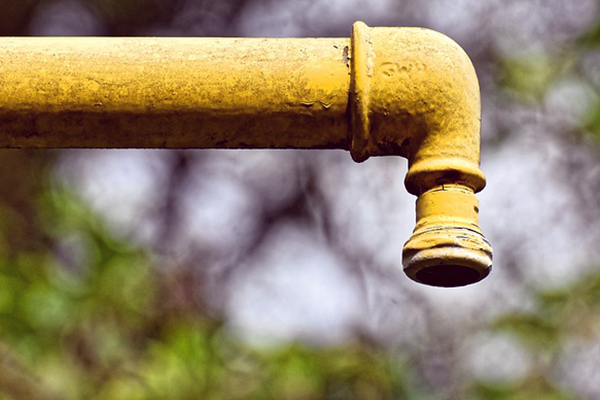
Image Source: pixabay.com
Can't get any water to come out of your shower-head? That's also probably a sign that you are dealing with hard water. Each time you turn your water on and off, a bit of the water sits at the edge of the pipe or shower-head. When there is a surplus of minerals in your water, mineral deposits can start to build up inside the plumbing, making it difficult for water to come out.
Generally, this is mostly seen in older pipes, such as steel pipes. PVC or copper pipes, which are commonplace these days, typically don't see this sort of blockage. That means you may not experience this issue if you have a newer home, but that doesn't mean you should ignore the other signs of hard water.

5. Your Clothes Aren't as Clean
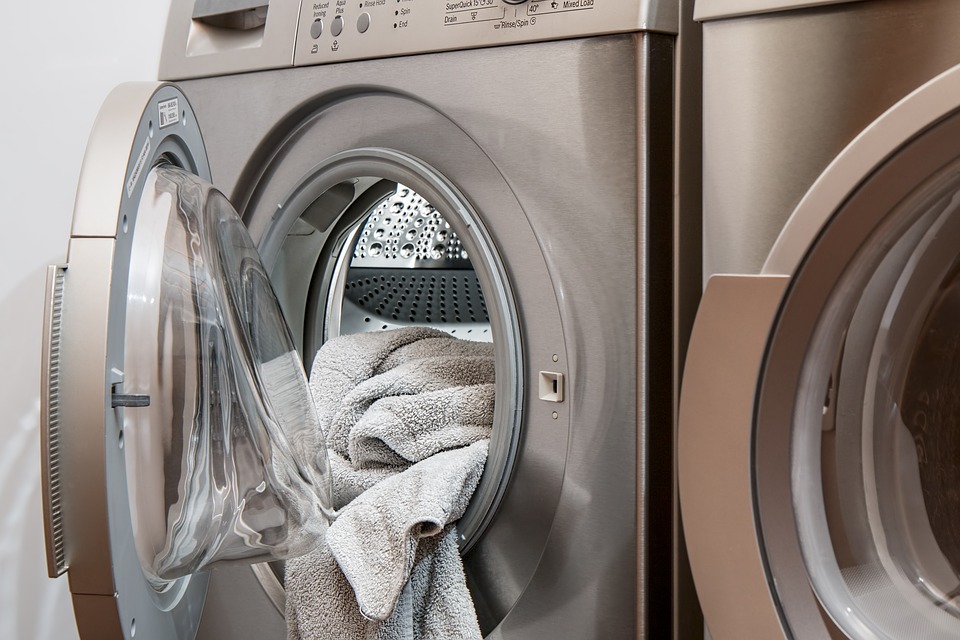
Image Source: pixabay.com
Remember when we talked about soap scum a few paragraphs ago? That same sort of event can transpire when you wash your clothes.
When the hard water minerals mic in with your detergent in the washing machine, they can leave a sort of powdery residue behind. This residue can make your clothes feel less clean, make the colors fade much faster, and diminish the longevity of the material itself.

6. Skin Irritation

Image Source: www.flickr.com
It's everyone's dream to have soft, smooth skin from head to toe. But if you have hard water, you can almost kiss that dream goodbye.
The minerals in the water will work against you, and often take out a lot of the moisture in your skin. This can lead to uncomfortable skin conditions like eczema. Also, since your soap will not be able to fully evaporate and dissolve, it will end up getting left behind on your skin, causing dry and itchy skin.

7. Appliances Do Not Last
As we mentioned in the “What Is Hard Water?” section, your appliances will have a hard time functioning to their full capacity when they have to deal with hard water. Things like your washing machine, water heater, dishwasher, toilet, and faucet can take a major hit thanks to hard water.
Not only will their lifespans decrease significantly, but they also will not be able to perform as well as they could while they are functioning. Many of them will become less efficient, not set to proper temperatures, or not clean in the way you want them to.

How to Fix Hard Water
So what do you do now? You know what hard water is and how to spot it out, but what can you do for it? Is there any way to protect your appliances?
Yes! There are a few different ways you can soften your water, each with their own methods of attack. The ion exchange water softener is often the most common method, and generally the most effective. To eliminate calcium and magnesium minerals in your water, the softener uses other minerals to cancel them out.
Generally speaking, these types of water softeners are full of sodium, or sometimes potassium, ions. When these ions mix in with the calcium and magnesium, they trade places with the sodium, effectively eliminating them from the water.
For those facing issues with a lot of iron and magnesium, those experiencing that brown stain in the sinks and toilets, may want to consider polyphosphates. This water treatment chemical reacts with soluble metals and coats them, reducing their effects on your water. Typically these are the most effective in low volumes with cold water applications.
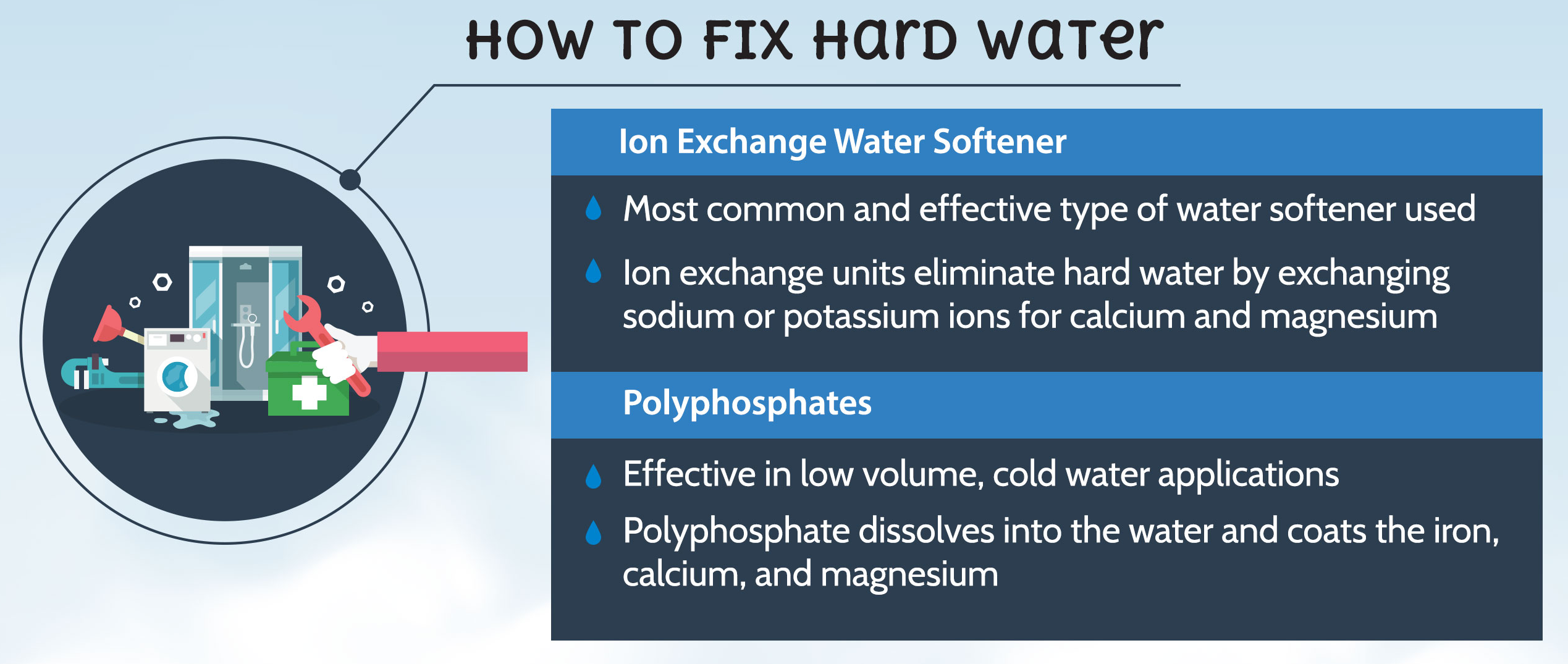
Another option that is relatively new in design is a magnetic or electronic water conditioner. These devices will create an energy field on your water as it passes through the pipes. This field attacks the mineral agents and alters them so that they are unable to form hard water in the first place. Since they cannot attach to the body of water, they pass away harmlessly down the drain.
This technology is still quite new but has proven to provide great results in commercial and industrial settings. It will require careful installation, maintenance, and understanding for it to properly do its job, but it can be quite effective.

All of these methods will have different reactions in different homes. Do not feel discouraged if one softener doesn't work for you. The effectiveness will often depend on the type of minerals in your water, the type of plumbing you have in your home, and how hard your water actually is.
Why Should I Fix My Water
What is hard water doing that's so detrimental? So my toilet won't last as long, big deal. What's the point in working so hard to fix it anyway?
There are a ton of reasons why you should try to fix your water. One of the main reasons is that it will keep your home running smoothly. Plumbing and appliances will work in the way they were intended, often in a shorter period of time. This means you can cut back on your water bill and electricity bill because you'll only have to wash your clothes once.
It'll also save you a ton of time. Think about how much energy it takes to scrub away that soap scum or get rid of that stain in your toilet. If your water is soft, you can reduce your cleaning regimen significantly. Your clothes will be cleaner and brighter, your sink will run quicker, and your skin won't dry out from pesky minerals.
Speaking of your body, there are actually quite a few health risks that occur with too much hard water. Your skin being the first major one. Drying out your skin can be very uncomfortable and potentially harmful, leading to things like eczema.
If your water has a high enough level of magnesium in it, consuming the water can have a laxative effect on your body in ways that might not be ideal. The excess minerals can also worsen pre-existing conditions like cancer, cardiovascular disease, Alzheimer's, and diabetes.
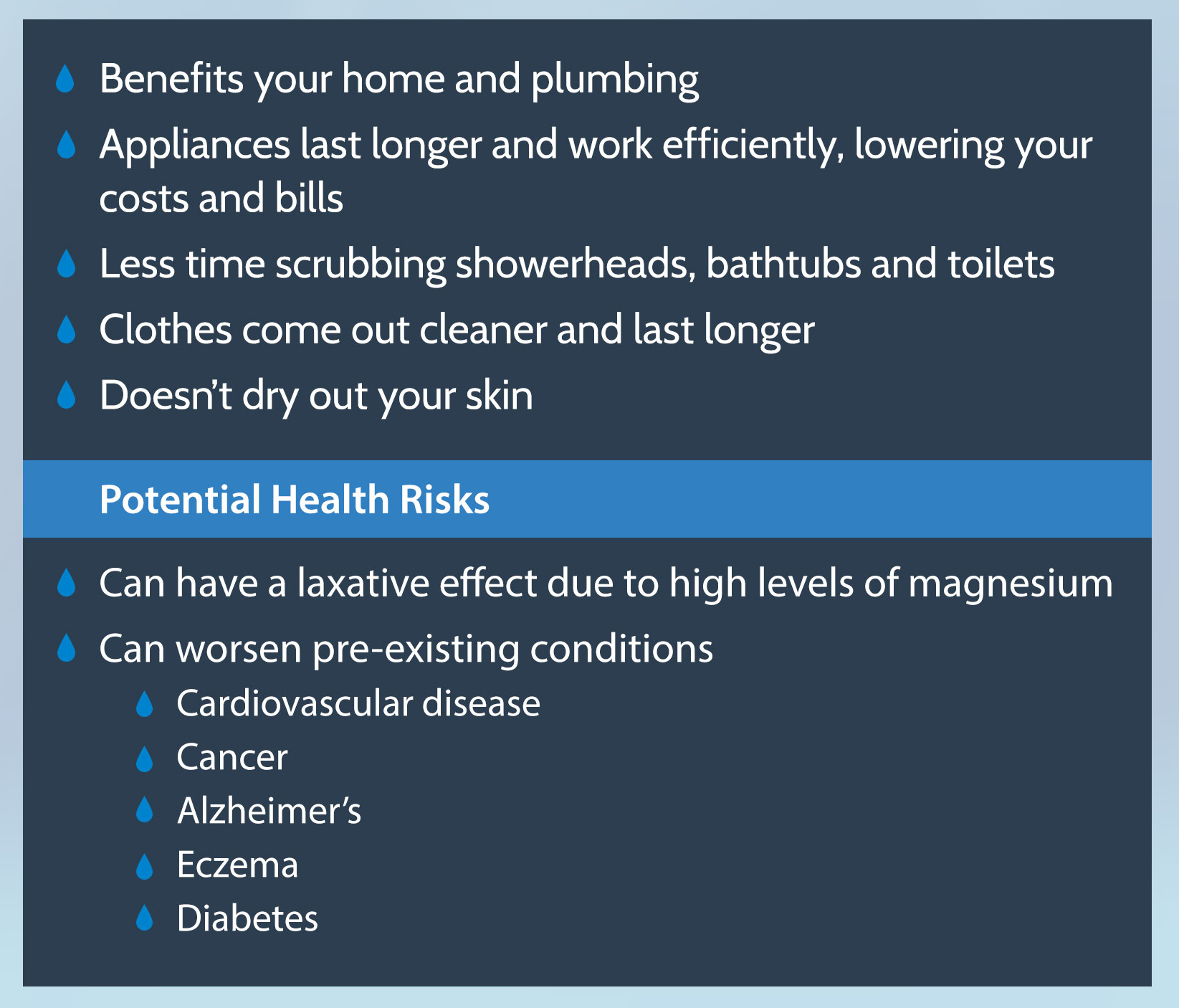
Enjoy Your Water Without a Side of Minerals
What is hard water? Check. What are the signs? Check. How can you fix it? Check. You now have all the information you need about hard water. You know what it is, how to spot it, how to fix it, and even why you should fix it in the first place.
Having a clear understanding of the problem can help you become more proactive about it, both in your own life and in the lives of those you care about. The solution is often quite simple and can save you a lot of hardship down the road.
Take the time to care for your water, and it will be sure to take care of you in return.

